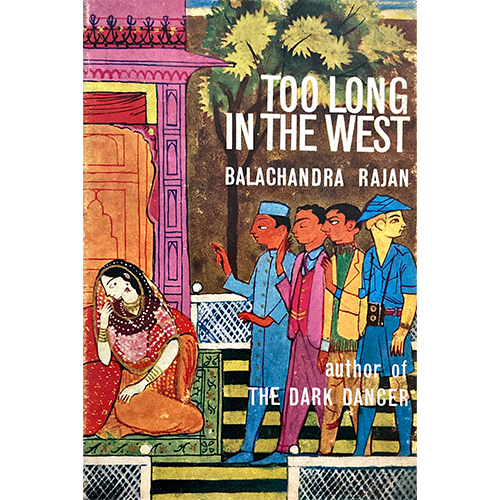Balachandra Rajan
Too Long in the West

‘If I lose one world I can always discover another.’
Too Long in the West follows the story of Nalini as she returns from Columbia University to her hometown of Mudalur in India. A rainy and muddy place, Nalini returns to a house filled with a strange assortment of men, each hoping to win her hand in marriage. Chaos ensues as each man tries to prove why he would be the best choice as a husband.
The book is quite satirical and funny for the most part. All these contrasting lives are dumped upon Nalini as she tries to understand what she actually wants from marriage. Among all the men, there is also one of her ex-classmates, Ernest, who randomly shows up to help prevent malaria in the area.
Ernest clashes with many of the residents as he tries to impart his own values. The exchanges are very on the nose, as Nalini exists in a sort of transitory middle ground. She has a deep affection for her home but is also changed by her education in the west. Although she finds herself conflicted by some of her newly adopted Western values, it’s seen more as a threat externally rather than internally.
Some of the men view Nalini’s education as a threat to the institution of arranged marriage. The knowledge of something more, ‘the knowledge to fight the arranged marriage, to expose it in all its revolting nakedness, its threats, its bribes and its pitiful desperations’.
In a sense she has been liberated by three years in America, but how true are these notions of freedom and progress? Though she has realised what has changed, she’s too balanced to be overthrown by her own freedom. Her independence becomes more shapely and vigorous, but it does not challenge the past.
We’ve changed and you’ve changed, but in the wrong direction. You won’t fit in. You’ve joined the lost generation, out of place everywhere and acceptable nowhere. You’ll always be an exile and an alien, a self-created foreigner, a refugee from yourself. You can’t belong. You’ll live in two worlds and fall between two stools.
Although her parents are the advocates for a marriage to take place, Nalini’s mother, Lakshmi, begins to reflect on her own marriage. Where has it got her? Is she happy? What does it mean, all these years later?
Children can, of course, dominate the mind for decades. But once that escapes you, you’re still left with the person opposite you. Do you feel the same? Bonded together by the rigidity of time. It can be the best thing in the world, it can be the worst thing in the world.
She found herself reflecting ruefully that he was not at all the person she had married. For thirty-two years she had been dragging herself back to it, and what, she asked herself pointlessly, was the result of it all?
Marriage is an institution at its core, and although attitudes towards it have changed, it still remains as strong as ever in the zeitgeist. The accepted finality in a relationship. What is partnership, what is marriage for? What are we aspiring to and where do we end up?
I imagine there’s not that much thought put into these questions, as it just seems like the inevitable next step, but life is longer than you think.
But circumstances are important too. They change what people are and what they think they’re capable of doing. I’d like to see you change the landscape not just in my own life, but in the lives of thousands of others. It’s what you were intended for. You’ve got this impatience to improve things which everyone jokes about and without which everything would be so much more meaningless.
So you must resign yourself to fate.